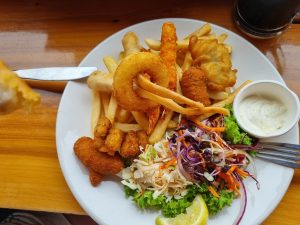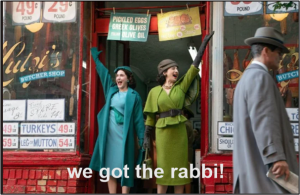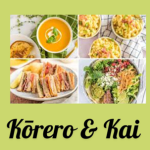The Joy of Food

This is the third in a series of posts from early 2025.
Late last year, our adult kids blessed us with the gift of a ‘mystery break’ – a holiday option where a package of return airfares, two nights accommodation and, in our case, a rental car – enables couples or families to experience a mini break they had not chosen for themselves. On a prosaic basis, this allows the airline to sell off unused seats, but it also offers guests the opportunity to arrive in an unknown destination and spend the days in doing things not planned in advance. We were only told where we were going a day or two before, and the city turned out to be Dunedin, where over fifty years ago we met, completed our degrees, and spent the first year of married life. It was great weather, and allowed spontaneous meet-ups with friends and family. But the best thing, to my mind, was the lovely food. From a delicious cooked breakfast with good coffee, through fish and chips on a pub verandah with the seagulls, to a superb Italian meal in the 110 year old heritage venue the Savoy, we feasted in style.
Food is important in the Bible too.
Once more Jesus spoke to them in parables, saying: ‘The kingdom of heaven may be compared to a king who gave a wedding banquet for his son. He sent his slaves to call those who had been invited to the wedding banquet, but they would not come. Again he sent other slaves, saying, ‘Tell those who have been invited: Look, I have prepared my dinner, my oxen and my fat calves have been slaughtered, and everything is ready; come to the wedding banquet.’
Matthew 22: 1 – 4
When I was growing up, summer holidays were mostly spent in self-catering accommodation in the form of faraway relatives’ homes that were opened to the extended family for the six weeks of the school break. We never stayed the whole time, but the weeks we did occupy the camp beds and limited washing facilities also meant lots of sitting around huge tables eating foods we didn’t often get at home. My great-great-uncle’s mudbrick house in Central Otago had a coal range, from which my Nana turned out delightfully fluffy scones and muffins, to be spread with home-made jams and jelly from Uncle Bill’s berry bushes. My other grandmother’s farmhouse, in the North Island, meant meat at every meal, fresh eggs and colourful preserved fruit in bottles. I now realise my Mum and Nana probably had slightly less of a holiday than the rest of us! They could however relax and enjoy the meals we took at roadside cafés to break the long car and ferry journey; these were often accompanied by ice cream on a cone, a rare treat before the advent of home freezers. I wish I could say my father’s daily trip to the river to fly-fish brought delicious piscatory delights, but he rarely caught one of the brown trout my uncles often snagged. I later discovered going fishing for my introvert Dad was his way of winding down from the feverish demands on a parish minister in those times. His annual Sabbath!
If we notice the stories about food we find in the Bible, we find there are plenty; the stories of Abraham, Elijah, David, Isaiah, feasts like Passover, Jesus’ parables, the loaves and fishes miracle and of course the Lord’s Supper. Our kids ministry recently enjoyed a series called Meals with Jesus, and some of us grownups also worked through the Scriptures around meals in Luke. Many of the food stories in the Bible are about God’s miraculous provision for his people, but the Great Banquet parables give us a different perspective. The feast is, as the Anglican liturgy reminds us, a ‘foretaste of the heavenly banquet prepared for all peoples’ – a glorious celebration of all who are in Christ. One of my friends has a standing joke he makes about earnest Baptists who are wont to ask “will you be present at the marriage supper of the Lamb?” It’s cheesy but reflects our firm hope for the future.
 Nevertheless, God’s good gift of food and shared meals are also for now. They feature in Jewish traditions; in the Talmud, a Seudat Mitzvah was the celebratory meal at a wedding, baby-naming ceremony or coming of age. (I guess its from the Jewish faith that we got the word holidays/holy days). Although even the Marvelous Mrs Maisel acknowledges the ethical questions around extravagant food-based events, the desire to have a party is planted deep in the culture. Samantha Solomon recounts her Jewish father’s ritual invitation: “We nearly didn’t survive, and that is worth celebrating; it’s time to eat!” I recently learned from a Jewish scholar that after the fall of the Temple in 70AD, the rabbis transferred the Jerusalem-based rituals to the Jewish home, where the altar became a table and parents became priests. For Christians too, a shared meal is an encounter with grace, a way to build community and caring, not just with family and friends, but at times also with strangers. That’s why we talk about ‘eating together’ rather than feeding, which is what animals do. Eating is a social task; people face each other and enjoy talking about what matters in their lives.
Nevertheless, God’s good gift of food and shared meals are also for now. They feature in Jewish traditions; in the Talmud, a Seudat Mitzvah was the celebratory meal at a wedding, baby-naming ceremony or coming of age. (I guess its from the Jewish faith that we got the word holidays/holy days). Although even the Marvelous Mrs Maisel acknowledges the ethical questions around extravagant food-based events, the desire to have a party is planted deep in the culture. Samantha Solomon recounts her Jewish father’s ritual invitation: “We nearly didn’t survive, and that is worth celebrating; it’s time to eat!” I recently learned from a Jewish scholar that after the fall of the Temple in 70AD, the rabbis transferred the Jerusalem-based rituals to the Jewish home, where the altar became a table and parents became priests. For Christians too, a shared meal is an encounter with grace, a way to build community and caring, not just with family and friends, but at times also with strangers. That’s why we talk about ‘eating together’ rather than feeding, which is what animals do. Eating is a social task; people face each other and enjoy talking about what matters in their lives.
Over winter, some churches in our city will host an event called Korero and Kai. Korero is the Maori word for conversation. These shared meals came about in 2022 after the loosening of our city’s Covid restrictions, a two-year series of gruelling lockdowns. The rationale was to enact the idea that the humble table can be a place of reconciliation between the generations, modelling “how the foolishness of God overturns the wisdom of the world” (Note 1) People who sign up are allocated to groups of three families, often intentionally intergenerational. They commit to sharing three meals over the four winter months. As they gather they share simple food, tell a few stories, and get to know each other better (last year, our group spanning 64 years played Headbands, it was a hoot!). These meals can take place in a home, a park or even a restaurant, though the principle of pot luck – where everyone both gives and receives – is preferred, so as to “cultivate a community of dignity”. (Note 2)
Note 1: Michael Rhodes in Arranging the Chairs in the Beloved Community. 2019.
Note 2: Rhodes and Holt 2018 https://www.amazon.com.au/Practicing-Kings-Economy-Michael-Rhodes/dp/0801075742

What’s your favourite food or place to eat? If it’s feasible, why not treat yourself to this meal or visit that place today? Maybe invite one of your favourite people or someone who would appreciate a special invitation.
13 You send rain on the mountains from your heavenly home,
and you fill the earth with the fruit of your labour.
14 You cause grass to grow for the livestock
and plants for people to use.
You allow them to produce food from the earth—
15 wine to make them glad,
olive oil to soothe their skin,
and bread to give them strength. Psalm 104: 13 – 15
